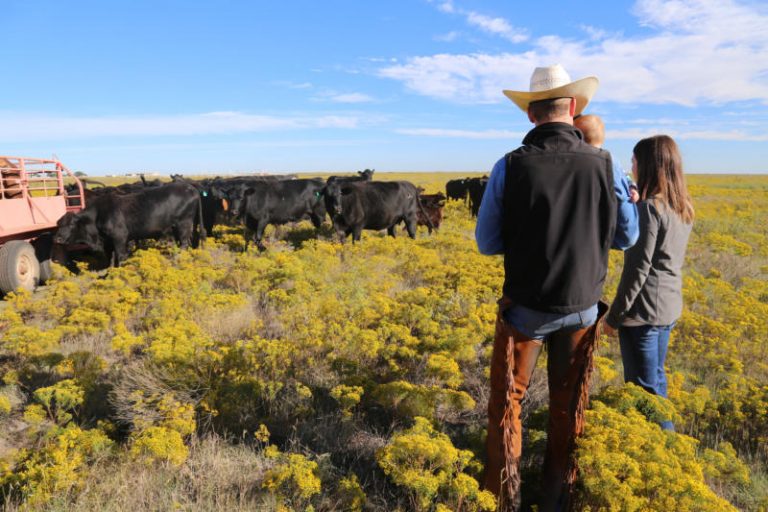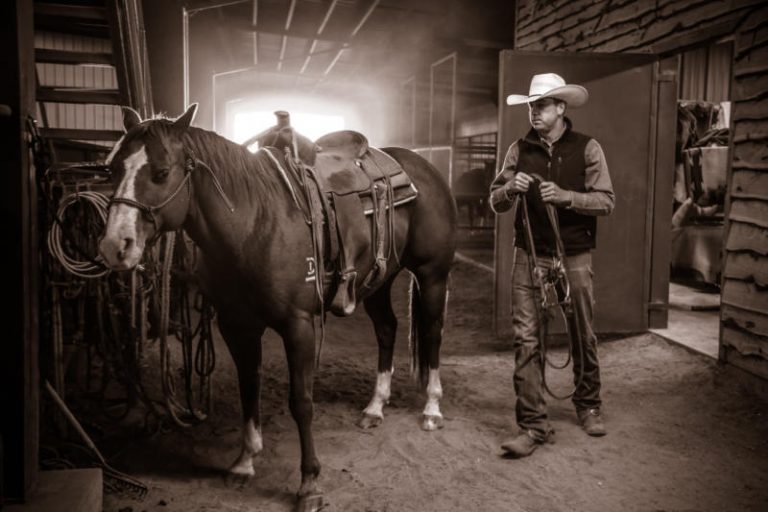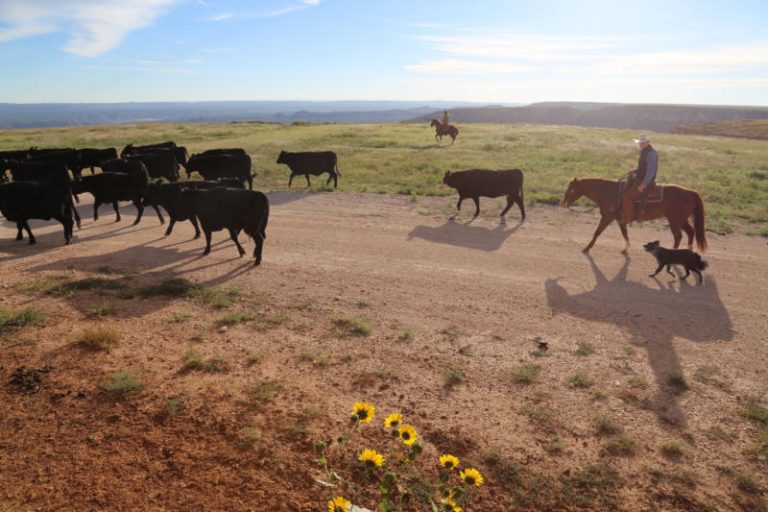If you are looking for an agent that understands agriculture and ranching, you’d be hard pressed to find a better one than Cooper Cogdell.

The sun begins to peek over the caprock of the Tule Ranch in Briscoe County, Texas. Cooper Cogdell walks out his front door, coffee mug in hand, ready to face the full day ahead of him. A warm golden glow begins to fill the deep canyons where Cooper heads to gather cattle, living out his dream.
A Passion for Ranching & Horses
Since Cooper was a little boy, he knew he wanted to be a cowboy like his father, grandfather, and great-grandfather before him. But, he also dreamed of being a Red Raider. While at Texas Tech, Cooper studied agricultural economics and was a member of the Texas Tech Ranch Horse Team. During his undergraduate education, he spent three years on the winning collegiate ranch horse team and coached the team for two years while getting his master’s degree.
“It was probably the most rewarding experience that I’ve ever had,” Cooper said, “The opportunities it presented were something I’ll never give up. The people I met through coaching, and the things I learned while coaching my peers, were beyond beneficial. It was challenging, no doubt. I learned some very good life lessons.”
Holly Cogdell, Cooper’s wife and fellow Tech alum, says her husband definitely used his gifts while coaching the ranch horse team.
“He’s good at teaching people,” Holly said. “He’s good at explaining things, and he’s patient. I feel that being the coach he got to share some of those gifts. He did a good job.”
Cooper worked with many leaders in the stock horse industry including Kim Lindsey and the late Kris Wilson. He credits his experiences with the team to helping him become a better horseman and rancher, which would come to play a larger role down the road.
The Real World
In January 2013 while Cooper was coaching and finishing out his last year as a graduate student, he and Holly got married. After graduation, the couple stayed in Lubbock and Cooper accepted a job with Plains Capital Bank as a credit analyst.
“I never thought I’d be in an office, wearing a suit every day,” Cooper said. “But, I worked with a lot of great people and learned a lot from that side of the desk.”
Although they cherished their friends and jobs in Lubbock, Cooper and Holly ached to be on the Cogdell family’s historic Tule Ranch where Cooper grew up.
“I really wanted to be a part of that,” Holly said, “a part of raising my future children on the ranch, in the home, but also on the ranch with Cooper. I wanted us all to be together,” said Holly with a grin. “After we got married, all I wanted to do was be a ranch wife. I was just so excited about that. I think I had a very picturesque idea of what being a ranch wife meant.”
Doors opened and closed, not allowing an opportunity for the young couple to move back to the ranch until the spring of 2015.
“We just didn’t have a peace about coming back here yet until April of 2015,” Holly said. “I remember the specific weekend we came home and were helping brand calves. Cooper and I both had the same feeling of ‘It’s time to come home. We’re ready.’ That next week I found out I was pregnant. It was meant to be.”
Returning to the Canyons
Cooper is the fourth generation of the Cogdell family to return and continue the family’s ranching legacy.
“I feel like in the population as a whole, we’re definitely seen as a minority,” Cooper said. “There are not many young people wanting to come back and do this anymore, just because it is so hard – the financial burden of it and the resources available.”
Cooper understands why young adults have a hard time returning to the family operation.
– I feel like in the population as a whole, we’re definitely seen as a minority. –
Cooper Cogdell
“With the estate taxes and other expenses, it’s just so hard to keep ranching anymore,” he said. “A lot of people work all their lives to get to this point. They want to retire and buy a ranch and raise cattle. For me to have the opportunity to come back home after college and ranch as a living, I feel very blessed.”

Cooper and Holly run their own commercial cattle and also have a partnership with Cooper’s brother, Blaze and his wife Lottie, while assisting their father, Dick.
“We’ve been talking a lot about simplifying things,” Cooper said. “Buying more land is expensive. It’s not always easy to make it work. This is why we’ve thought and prayed about it so much, about partnering and trying to be more effective in the way we run a business and the way we ranch.”
Not only have the Cogdell’s been a successful cattle ranching family for over 100 years, but they also raise their own ranch horses and have produced many great cutting horses for the show pen.
Cooper said one challenge that comes with a family ranching operation is the lack of separation between work and home, making it easy to drag work problems into family problems.
“But we’ve been blessed,” he said. “Our family gets along really well. When we’re working cattle, it is usually just family. Nowadays, we’ve got so many cousins and aunts and uncles. Everybody just jumps in and helps out.”
Home Is Where the Heart Is
The original Tule Ranch, founded in 1954, is currently supporting seven Cogdell families. Many evenings you can find a handful of grandkids gathered at their Nana Bette’s home, discussing cutting horses and old family stories, or at one of the aunts’ and uncles’ houses for supper and a highly competitive pick-up basketball game on the caliche drive way. The care and mutual respect that runs through the family is beyond evident, as well as their love for the ranch and the land they call home.
“Being amongst the Lord’s creation, the land becomes a part of you,” Cooper said.
“Especially these canyons. They’ve always been special to our family. They’re so tough on cattle, vehicles, people, and horses, but there’s something majestic about them – just the ruggedness of them. It’s an art form that God created and we get to live in them.”

“The stuff that you experience out here are things you can’t experience anywhere else. Dealing with animals, the joy and pain of life, learning responsibility, and work ethic, you just don’t see that much anymore,” Cooper said.
Stirring a pot of soup on the stove, Holly paused looking down at her 10-month-old daughter, McCrae, playing on the floor.
“I think agriculture, in general, really requires you to trust in a higher power and trust in something bigger than yourself, because you don’t have control of the animals, or the rain, or the grass growing, or any of that,” she said. “All you can do is your very best to be a good steward. It makes you realize that there’s something bigger going on and to trust that God is in control of it.”
– I think agriculture, in general, really requires you to trust in a higher power. –
Holly Cogdell
The young couple agrees ranching is not where their hope is found, but where their joy is found. No matter how challenging it may get, ranching is what they love to do, and it’s a desire the Lord put in their hearts.
Spurs scraping against the porch steps, Cooper swipes off his hat and shuffles his way inside his simple ranch home. Kissing Holly on the forehead, he scoops up his baby girl and says a silent prayer of thankfulness for the life he feels blessed to live and the dream he gets to live daily.
Written and photographs by Emily McCartney, senior Agricultural Communications student at TTU
Originally posted as part of the Agriculturalist magazine. This magazine is produced by senior Agricultural Communications students from Texas Tech University.